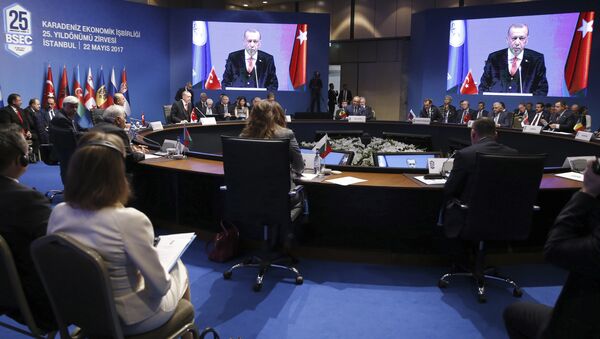Kristian Rouz — Turkey's government is introducing several measures aimed at supporting the nation's struggling economy, as officials seek to support consumer demand at home, as well as exports of manufactured goods. The new policies come as the Turkish economy faces a structural recession following this year's financial turmoil.
According to Turkish Labour Minister Zehra Zumrut Selcuk on Tuesday, the cabinet will hike the minimum wage by 26 percent, to 2,020 liras, or $381, per month. The changes will take effect next year.
This, in turn, is expected to support the nation's faltering GDP expansion.
Meanwhile, the Turkish economy is officially in a recession, as the nation's 3Q18 GDP growth rate dropped to —1.1 percent quarter-on-quarter, compared to 0.6-percent expansion in Q2, and a 1.9-percent growth in 3Q17. Preliminary growth estimates for this outgoing quarter suggest economic contraction will continue, and could likely extend well into the next year.
"The quarterly contraction trend will continue in the fourth quarter and it looks like we will see a yearly slump in the fourth quarter as well", Inan Demir of London-based Nomura International Plc. said.
READ MORE: UK Economy Posts Solid Q3 GDP Growth Despite Brexit Uncertainty
In this light, economists expect the Turkish government to enact additional fiscal or monetary accommodation next year, albeit an increase in minimum pay appears to be a solid first step.
"Some easing in monetary and/or fiscal policy looks likely in early 2019 to cushion the domestic economy", Nigel Rendell of Medley Global Advisors said in London. "Investors would much prefer policymakers to slay the ‘inflation dragon' before trying to resurrect the domestic economy".
The Turkish government, for its part, said the rising exports and slowing imports contributed some 6.7 percent to the nation's GDP growth rate — however, these gains were offset by the financial turmoil and a stand-off with the US earlier this year.
In the meantime, Turkish President Tayyip Erdogan said that the nation is still on course to meet its yearly export target of $170 bln, despite the international trade and political woes.
Erdogan said the Turkish economy had demonstrated sustainable economic expansion over the past 16 years, with the total amount of foreign investment into the country exceeding $201 bln. However, he said that Turkey had successfully overcome this year's plunge of the national currency and a spike in inflation — a statement some economists contest.
"It is important that the central bank reiterates a strong commitment to maintain tight monetary policy despite the sharp slowdown in economic activity until the outlook for inflation improves markedly", Piotr Matys of Rabobank said.
READ MORE: Japanese Yen, Swiss Franc Rally Amid US Political Tensions, Trade Woes
But Erdogan is optimistic, saying that Turkey's current account balance is gradually getting better due to robust exports. His cabinet officials share the same sentiment.
"We ship not only goods but we also export TV dramas, software programs, movies, health services and our culture", Trade Minister Ruhsar Pekcan said.
However, despite all the positive changes outlined by Turkish officials, the economy is in a recession, and it remains to be seen whether the limited fiscal accommodation announced this week will help Ankara get the economy back on track.






